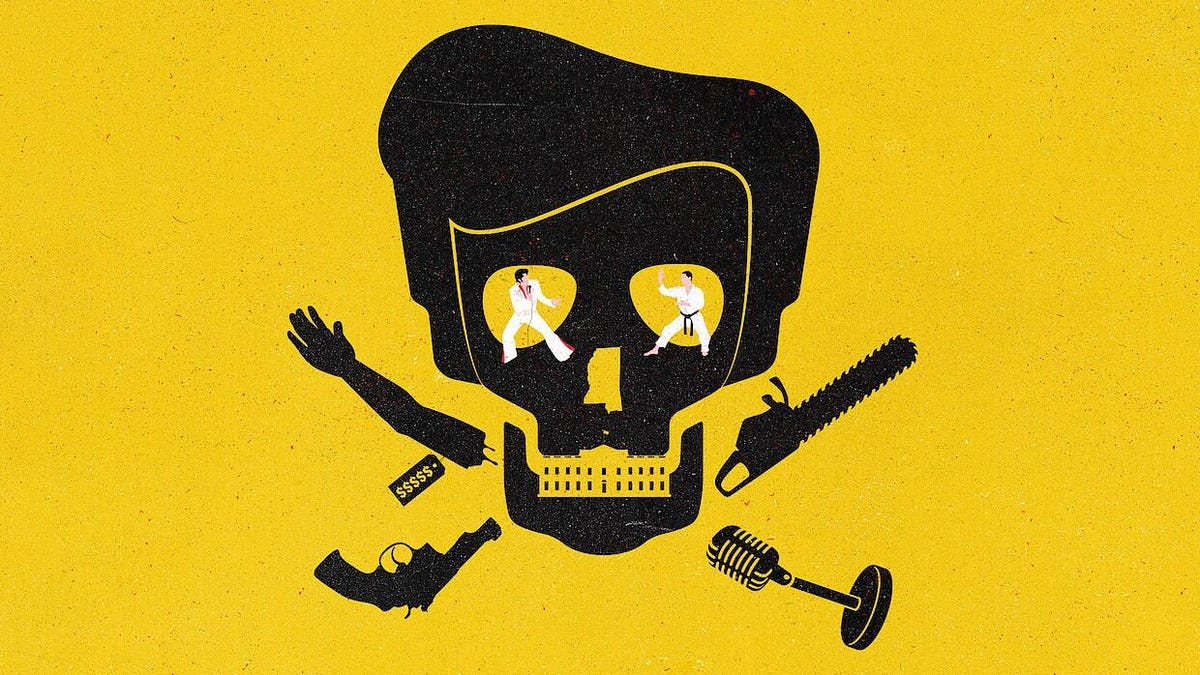Netflix has no shortage of documentaries to sift through, so it’s a personal celebration when I find something that truly stands out. And let me tell you, The Kings of Tupelo: A Southern Crime Saga stands way out. At just three one-hour episodes, it’s an easy binge, but the story that unfolds here has stayed with me for months.
Emmy-winning directing duo Maclain and Chapman Way, the brothers behind Wild Wild Country, helmed the series, which explores the stranger-than-fiction true crime tale of Paul Kevin Curtis, an Elvis impersonator and outspoken conspiracy theorist who finds himself at the center of a small-town rivalry that evolves into a terrorist manhunt.
The legend of Elvis Presley looms large in Tupelo, Mississippi (the King’s birthplace), and informs much of who Curtis is. His fascination with Elvis led him to don a bedazzled body suit and hit the stage to do his best rendition of Presley. In a town where Elvis impersonators are a dime a dozen, Curtis made a name for himself. Seriously — he won awards.
Netflix Review: Our Top Choice in a Crowded Market
Paul Kevin Curtis wears a bag over his head and addresses the camera in a scene from the Netflix docuseries The Kings of Tupelo.
Seeing his brother’s success, Jack Curtis (a man who runs a successful insurance agency) tried his hand at doing the Elvis thing, which led the brothers to form Double Trouble, the world’s first duo revue honoring The King.
This is just one of the many quirky details that make The Kings of Tupelo such a fun watch. As someone unfamiliar with the real life story that inspired the series, I was not expecting the unpredictable twists waiting for their turn to flip things on their heads. Things go from one WTF moment to another quickly, making this a wild and never dull watch.
I’ve seen criticism that the series perpetuates stereotypes about the South, and I can understand that argument. However, it wasn’t my experience watching the series. As someone who has never been to the area, I found the program’s array of colorful characters (and there are a lot) endearing to the story being told.
Whether it’s Steve Holland, the funeral home director and former politician, who happily leans into some big Boss Hogg energy, or sociopathic martial arts teacher James Everett Dutschke, who would probably send chills up John Kreese’s spine, The Kings of Tupelo is littered with eccentric folks who feel like they walked right out of a Coen Brothers movie.
Throughout the three episodes, Curtis tells his story through the guise of a finished screenplay, adding an off-kilter, cinematic quality to the whole thing. The Ways lean into this narrative voice, as unreliable as it sometimes feels, giving Curtis’s vision full power. The result is an engaging documentary that sometimes feels like it was inspired by a sprawling made-up yarn he found during a deep dive on Reddit.
Still, there are plenty of facts that substantiate the ride Curtis is taking us on. Yes, he picked fights with various businesses and people in town. Sure, he truly does idolize self-improvement guru Tony Robbins. He’s a conspiracy theory nut who faced one fallback after another. Like the time he accidentally set fire to his home (he blamed government agents for this), which only reinforced his role as the undeterred victim.
Curtis is a character full of contradictions. He can’t seem to get out of his own way, incapable of learning from his own mistakes or admitting he may have been the one at fault. He’s also the self-imposed embodiment of a small-town underdog with impeccable storytelling chops.
Paul Kevin Curtis, the main character in the Netflix docuseries The Kings of Tupelo, speaks from inside his trailer.
And that is probably what makes him so fascinating to watch. One minute, you want to hug him — the next, you want to punch him in the neck.
The craziness hits a climax in an impeccably paced third episode, which drops one unbelievable bombshell after another on the viewer. It’s a truly riveting watch that culminates with an unexpected pièce de résistance reveal that makes the time it took to get here absolutely well-earned.
I mentioned a terrorist attack earlier, and this is where the series leans heavily into the true crime genre, and it’s also what propelled Curtis into the public eye. I won’t divulge all the details, but I will say the case involves one of Curtis’s Tupelo rivalries, an assassination attempt of the president and a bizarre revenge plot that nearly put Curtis in prison for life.
The Kings of Tupelo is really that good. It explores conspiracy culture and the internet echo chambers that fuel it, and it’s a fun look at the colorful community of Tupelo, Mississippi, and the enduring legacy of the King of Rock and Roll.
Moreover, the series is a surprisingly engaging underdog tale about a man who can’t keep his mouth shut or learn from his mistakes, and the stranger-than-fiction criminal conspiracy he unwittingly became the victim of. Add all these elements up, and it’s no wonder that, for the past few months, The Kings of Tupelo has been living rent-free in my head.
Read the full article here


